后面接动词ing形式的动词
只能接ing的动词

只能接ing的动词allow/permit允许consider 考虑suggest/advice 建议finish 完成imagine 想象practice 练习understand 明白appreciate/enjoy 喜欢miss 错过,怀念prevent阻止forbid禁止escape避免include 包括forgive/pardon/excuse 原谅dislike 厌恶discuss 讨论report 报道admit承认mind 介意risk 冒险can't stand 不能忍受burst out 突然开始feel like 想要insist on 坚持delay/put off 推迟give up 放弃be busy 忙于be worth 值得1.Enjoy/like/love/be fond of doing sth. 喜欢做某事eg:She is fond of doing chemical experiments. 她喜欢做化学实验。
2.Keep/keep on/carry on/go on doing sth. 继续做某事eg:We keep on going on and on cause this is where we both belong. 让我们一直拥有,并走下去,因为这是我们俩共同拥有的。
3.Feel like doing sth. 想要做某事eg:I feel like giving up on the job. 我觉得我不能从工作中摆脱出来。
4.Practice doing sth. 练习做某事eg:They practice doing so quickly and accurately. 他们学习快而准确的做。
5.Give up doing sth. 放弃做某事eg:If my boss asks me to do such kind of thing any more, I'll give up working. 如果我老板再要我做这样的事,我就辞职不干了。
动词ing形式的用法及变化规则
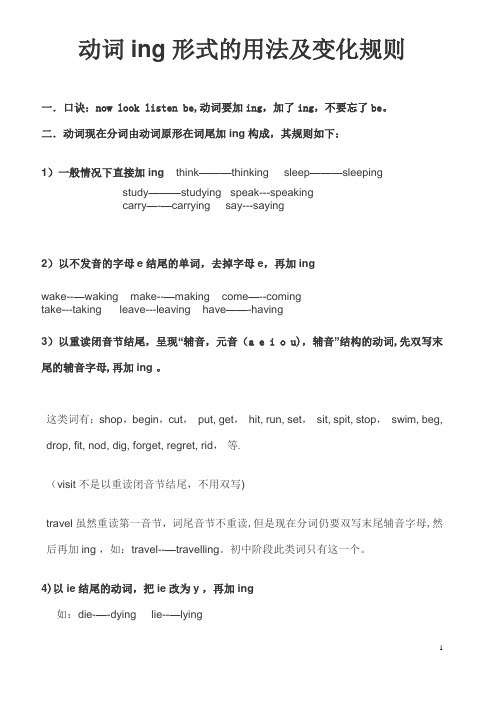
动词ing形式的用法及变化规则一.口诀:now look listen be,动词要加ing,加了ing,不要忘了be。
二.动词现在分词由动词原形在词尾加ing构成,其规则如下:1)一般情况下直接加ing think———thinking sleep———sleepingstudy———studying speak---speakingcarry—-—carrying say---saying2)以不发音的字母e结尾的单词,去掉字母e,再加ingwake--—waking make--—making come—--comingtake---taking leave---leaving have——-having3)以重读闭音节结尾,呈现“辅音,元音(a e i o u),辅音”结构的动词,先双写末尾的辅音字母,再加ing 。
这类词有:shop,begin,cut,put, get,hit, run, set,sit, spit, stop,swim, beg, drop, fit, nod, dig, forget, regret, rid,等.(visit 不是以重读闭音节结尾,不用双写)travel虽然重读第一音节,词尾音节不重读,但是现在分词仍要双写末尾辅音字母,然后再加ing ,如:travel--—travelling。
初中阶段此类词只有这一个。
4)以ie结尾的动词,把ie改为y ,再加ing如:die-—-dying lie--—lying1一. 写出下列动词的现在分词形式work___________ visit__________ play__________ study________dance_______ have__________ travel_________take__________drop__________ sing__________ shop________ swim_________ lie__________二.选择题练习1。
动词ing形式的用法及变化规则

动词i n g形式的用法及变化规则(总4页)--本页仅作为文档封面,使用时请直接删除即可----内页可以根据需求调整合适字体及大小--动词ing形式的用法及变化规则一.动词ing形式的用法1.正在进行时中,谓语动词后加ing. 如:I'm playing football.2.一些特殊表达..如: be good at doing sthenjoy doing sth.be busy doingfeel like doingthank you for doingdo some cooking/cleaning/reading/shopping/washinggo swimming/fishing/shopping/skating/boating二.动词现在分词由动词原形在词尾加ing构成,其规则如下:1)一般情况下直接加ing think---thinking sleep---sleeping study---studying speak---speaking carry---carrying say---saying2)以不发音的字母e结尾的单词,去掉字母e,再加ingwake---waking make---making come---comingtake---taking leave---leaving have---having3)以重读闭音节结尾,呈现“辅,元,辅”结构的动词,先双写末尾的辅音字母,再加ing 。
初中学过的这类词有:begin,cut, get, hit, run, set, sit, spit, stop, swim, beg, drop, fit, nod, dig, forget, regret, rid, 等。
(visit 不是以重读闭音节结尾,不用双写)travel虽然重读第一音节,词尾音节不重读,但是现在分词仍要双写末尾辅音字母,然后再加ing ,如:travel---travelling.初中阶段此类词只有这一个。
动词-ing形式的时态和语态变化
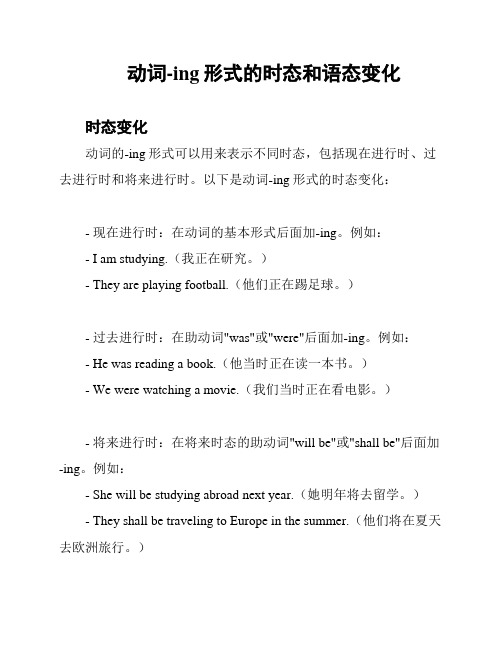
动词-ing形式的时态和语态变化时态变化动词的-ing形式可以用来表示不同时态,包括现在进行时、过去进行时和将来进行时。
以下是动词-ing形式的时态变化:- 现在进行时:在动词的基本形式后面加-ing。
例如:- I am studying.(我正在研究。
)- They are playing football.(他们正在踢足球。
)- 过去进行时:在助动词"was"或"were"后面加-ing。
例如:- He was reading a book.(他当时正在读一本书。
)- We were watching a movie.(我们当时正在看电影。
)- 将来进行时:在将来时态的助动词"will be"或"shall be"后面加-ing。
例如:- She will be studying abroad next year.(她明年将去留学。
)- They shall be traveling to Europe in the summer.(他们将在夏天去欧洲旅行。
)语态变化动词的-ing形式还可以用来表示被动语态。
被动语态的构成是将助动词"be"加在动词的-ing形式之前。
以下是动词-ing形式的语态变化:- 现在进行时的被动语态:将"am/is/are"加在动词的-ing形式之前。
例如:- The car is being repaired.(这辆车正在被修理。
)- The house is being renovated.(这栋房子正在被翻新。
)- 过去进行时的被动语态:将"was/were"加在动词的-ing形式之前。
例如:- The cake was being baked when I arrived.(当我到达时,蛋糕正在被烘焙。
)- The bookshelves were being installed yesterday.(书架昨天正在被安装。
【英语知识点】动词后只能接动词ing的情况
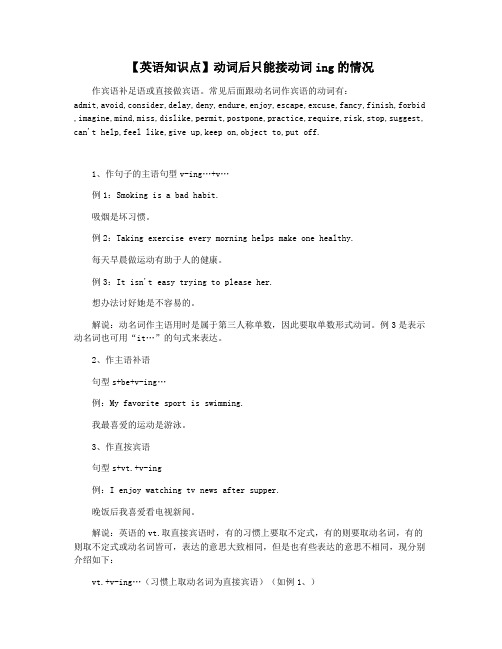
【英语知识点】动词后只能接动词ing的情况作宾语补足语或直接做宾语。
常见后面跟动名词作宾语的动词有:admit,avoid,consider,delay,deny,endure,enjoy,escape,excuse,fancy,finish,forbid ,imagine,mind,miss,dislike,permit,postpone,practice,require,risk,stop,suggest, can't help,feel like,give up,keep on,object to,put off.1、作句子的主语句型v-ing…+v…例1:Smoking is a bad habit.吸烟是坏习惯。
例2:Taking exercise every morning helps make one healthy.每天早晨做运动有助于人的健康。
例3:It isn't easy trying to please her.想办法讨好她是不容易的。
解说:动名词作主语用时是属于第三人称单数,因此要取单数形式动词。
例3是表示动名词也可用“it…”的句式来表达。
2、作主语补语句型s+be+v-ing…例:My favorite sport is swimming.我最喜爱的运动是游泳。
3、作直按宾语句型s+vt.+v-ing例:I enjoy watching tv news after supper.晚饭后我喜爱看电视新闻。
解说:英语的vt.取直接宾语时,有的习惯上要取不定式,有的则要取动名词,有的则取不定式或动名词皆可,表达的意思大致相同,但是也有些表达的意思不相同,现分别介绍如下:vt.+v-ing…(习惯上取动名词为直接宾语)(如例1、)admit(承认),advise(劝告),avoid(避免),consider(考虑),escape(脱逃),finish(做完),keep(on)(持续),practice(练习),quit (停止),resist(抵抗),risk(冒险),stand(忍受——否定句),stop(停止),understand(了解),etc.感谢您的阅读,祝您生活愉快。
动词后面加ing的动词

用法归纳:有的动词或短语动词后只能用动名词而不能接不定式。
如allow, permit(允许), consider(考虑), suggest, advice(建议), suggest, advice(反复; 不停), finish(完成), imagine(想象), practise(练习), understand(明白), appreciate, enjoy(喜欢), miss(错过; 怀念), prevent(阻止), forbid(禁止), escape(避免), include(包括), forgive, pardon, excuse(原谅), dislike(厌恶), discuss(讨论), report(报道), admit(承认), mind(介意), risk(冒险), can’t stand(不能忍受), burst out(突然开始), feel like(想要), insist on(坚持), delay, put off(推迟), give up(放弃), be busy(忙于), be worth(值得)等。
高中阶段能接-ing分次作宾语的常见动词:mind(介意), suggest(建议), enjoy(欣赏,), admit(承认), appreciate (感激,欣赏), avoid(避免), delay(推迟), dislike(不喜欢,厌恶), escape(逃脱), finish(完成), forgive(宽恕), imagine(想象), keep (保持), miss(错过), practise(训练), resist(抵抗,抵制), risk (冒险), deny(拒绝,否认), consider(考虑)等。
高中阶段常见的带介词to的短语,后接-ing分词或名词。
如:admit to(承认), contribute to(捐助、贡献), get down to(着手做), give way to(让位于),keep to (坚持、遵守), lead to (导致),look forward to(期待), take to(从事), turn to (求助于), stick to (忠于、坚持), point to(指向、表明), see to (注意、处理), be used to (习惯于), devote oneself to (献身于), be equal to (胜任的、等于), be familiar to (为……熟悉).有些动词既能接不定式,又能接-ing分词,含义有所不同:①forget, remember, regret等词后面接不定式表示不定式动作后于谓语动作,而后接-ing分词作宾语表示分词动作先于谓语动作。
动词ing形式的用法及变化规则
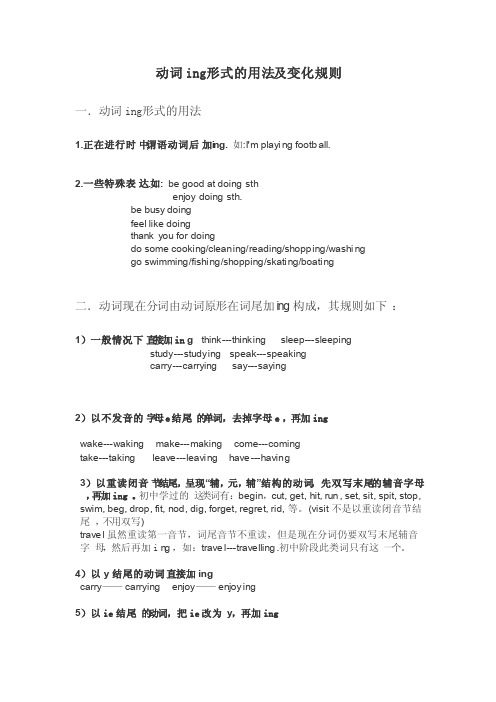
动词ing形式的用法及变化规则一.动词ing形式的用法1.正在进行时中,谓语动词后加i ng. 如:I'm playin g footba ll.2.一些特殊表达..如: be good at doingsthenjoydoingsth.be busy doingfeel like doingthankyou for doingdo some cookin g/cleani ng/readin g/shoppi ng/washin ggo swimmi ng/fishin g/shoppi ng/skatin g/boatin g二.动词现在分词由动词原形在词尾加ing构成,其规则如下:1)一般情况下直接加ing think---thinki ng sleep---sleepi ngstudy---studyi ng speak---speaki ngcarry---carryi ng say---saying2)以不发音的字母e结尾的单词,去掉字母e,再加ingwake---waking make---making come---comingtake---taking leave---leavin g have---having3)以重读闭音节结尾,呈现“辅,元,辅”结构的动词,先双写末尾的辅音字母,再加ing。
初中学过的这类词有:begin,cut, get, hit, run, set, sit, spit, stop, swim, beg, drop, fit, nod, dig, forget, regret, rid, 等。
(visit不是以重读闭音节结尾,不用双写)travel虽然重读第一音节,词尾音节不重读,但是现在分词仍要双写末尾辅音字母,然后再加in g ,如:travel---travel ling.初中阶段此类词只有这一个。
动词ing形式的用法及变化规则
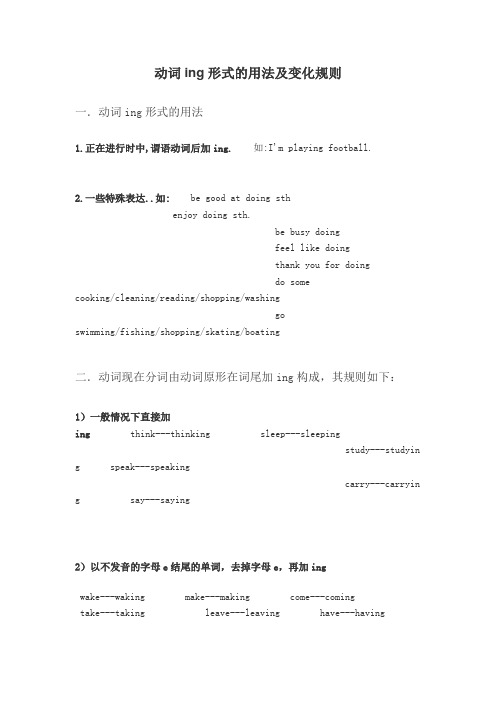
动词ing形式的用法及变化规则一.动词ing形式的用法1.正在进行时中,谓语动词后加ing. 如:I'm playing football.2.一些特殊表达..如: be good at doing sthenjoy doing sth.be busy doingfeel like doingthank you for doingdo somecooking/cleaning/reading/shopping/washinggoswimming/fishing/shopping/skating/boating二.动词现在分词由动词原形在词尾加ing构成,其规则如下:1)一般情况下直接加ing think---thinking sleep---sleepingstudy---studyin g speak---speakingcarry---carryin g say---saying2)以不发音的字母e结尾的单词,去掉字母e,再加ingwake---waking make---making come---comingtake---taking leave---leaving have---having3)以重读闭音节结尾,呈现“辅,元,辅”结构的动词,先双写末尾的辅音字母,再加ing 。
初中学过的这类词有:begin,cut, get, hit, run, set, sit, spit, stop, swim, beg, drop, fit, nod, dig, forget, regret, rid, 等。
(visit 不是以重读闭音节结尾,不用双写)travel虽然重读第一音节,词尾音节不重读,但是现在分词仍要双写末尾辅音字母,然后再加ing ,如:travel---travelling.初中阶段此类词只有这一个。
4)以y 结尾的动词直接加ingcarry——carrying enjoy——enjoying5)以ie结尾的动词,把ie改为y ,再加ingdie---dying lie---lying要特别注意有些动词没有进行时态.1、表示状态、思想、感情和感觉的动词,如:see, hear, love, know, want, hope, think等,没有进行时态。
动词ing形式

B. 在begin/start, continue之后,用动
词-ing和不定式,意义无甚区别,
尤其是当主语是人的时候。
C. 在动词forget,remember,regret之
后,用动词-ing与不定式意义不同。 动词-ing表示动作先于谓语发生, 不定式表示后于谓语动作,如:
1) I remember posting the letter. 我记得我已把信寄了。 2) I’ll remember to post the letter. 我会记着去寄信的。 3) I shall never forget seeing the famous writer. 我永远不会忘记见到过那位著名 _____________________________ 作家。 _____
touching.
他对母亲的关爱很感人。
She was very pleasing in her appearance.
The music is exciting.
②既可接动词-ing又可接不定式作宾语 的动词,常见的有:begin, start, continue, like, love, prefer, mean, forget, remember, hate等。 A. 在like, love, hate, prefer等动词之后, 用-ing或不定式意义上没有什么不同, 只是侧重点有些不同,动名词表示泛 指的动作,不定式表示具体的一次性 动作。
4) Don’t forget to write to your mother. 不要忘了给你母亲写信。 _____________________ 5) 我真后悔没赶上那次报告会。 _______________________ I regret missing the report. 6) 我遗憾地告诉你我不能接受你的建议。 ___________________________ I _______ regret to say I can’t take your advice.
后面可以跟ing形式的动词
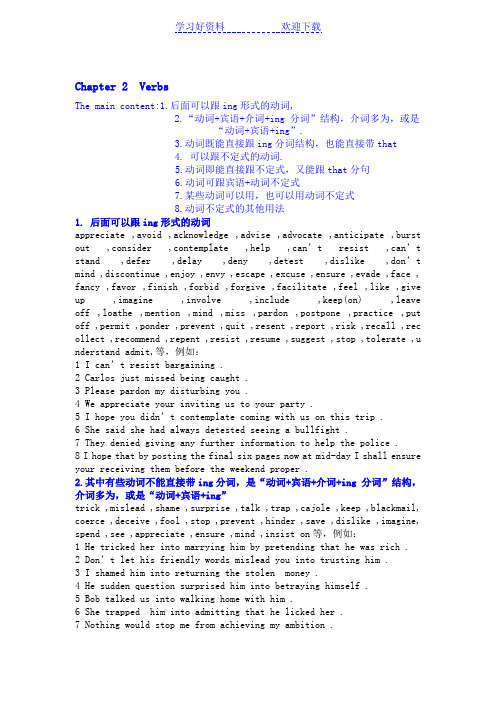
Chapter 2 VerbsThe main content:1.后面可以跟ing形式的动词,2.“动词+宾语+介词+ing 分词”结构,介词多为,或是“动词+宾语+ing”.3.动词既能直接跟ing分词结构,也能直接带that4. 可以跟不定式的动词.5.动词即能直接跟不定式,又能跟that分句6.动词可跟宾语+动词不定式7.某些动词可以用,也可以用动词不定式8.动词不定式的其他用法1. 后面可以跟ing形式的动词appreciate ,avoid ,acknowledge ,advise ,advocate ,anticipate ,burst out ,consider ,contemplate ,help ,can’t resist ,can’t stand ,defer ,delay ,deny ,detest ,dislike ,don’t mind ,discontinue ,enjoy ,envy ,escape ,excuse ,ensure ,evade ,face , fancy ,favor ,finish ,forbid ,forgive ,facilitate ,feel ,like ,give up ,imagine ,involve ,include ,keep(on) ,leave off ,loathe ,mention ,mind ,miss ,pardon ,postpone ,practice ,put off ,permit ,ponder ,prevent ,quit ,resent ,report ,risk ,recall ,rec ollect ,recommend ,repent ,resist ,resume ,suggest ,stop ,tolerate ,u nderstand admit,等,例如:1 I can’t resist bargaining .2 Carlos just missed being caught .3 Please pardon my disturbing you .4 We appreciate your inviting us to your party .5 I hope you didn’t contemplate coming with us on this trip .6 She said she had always detested seeing a bullfight .7 They denied giving any further information to help the police .8 I hope that by posting the final six pages now at mid-day I shall ensure your receiving them before the weekend proper .2.其中有些动词不能直接带ing分词,是“动词+宾语+介词+ing 分词”结构,介词多为,或是“动词+宾语+ing”trick ,mislead ,shame ,surprise ,talk ,trap ,cajole ,keep ,blackmail, coerce ,deceive ,fool ,stop ,prevent ,hinder ,save ,dislike ,imagine, spend ,see ,appreciate ,ensure ,mind ,insist on等,例如:1 He tricked her into marrying him by pretending that he was rich .2 Do n’t let his friendly words mislead you into trusting him .3 I shamed him into returning the stolen money .4 He sudden question surprised him into betraying himself .5 Bob talked us into walking home with him .6 She trapped him into admitting that he licked her .7 Nothing would stop me from achieving my ambition .8 There was nothing to prevent her from doing so .9 What kept you from joining me ?10 Don’t let me hinder you from doing .11 He could hardly restrain himself from shouting aloud .12 A sailor saved him from drawing .13 I dislike people telling me what to think.14 I can’t imagine him working in an office .15 Would you rather spend time gardening or spend money paying somebody to do it for you ?16 Did you see her talking to the postman ?3.有些动词既能直接跟ing分词结构,也能直接带thatacknowledge ,admit ,advocate ,anticipate ,appreciate ,deny ,fancy ,im agine ,suggest ,mean(entail) ,mention ,propose ,recall ,recollect ,un derstand1 The watchman reported finding the door open .or The watchman reported that he had found the door open .2 He anticipated getting much pleasure from the reading of that book . or He anticipated that he would get much pleasure from the reading of that book .4.下面可以跟不定式的动词agree ,aim ,apply ,arrange ,advise ,allow ,afford ,appear ,ask , attempt,bear ,begin ,continue ,choose ,claim ,beg ,care ,consent , contrive ,dare,decide ,decline ,demand ,deserve,desire,determine ,exp ect,fail,fear,forbid,forget,go,go on ,guarantee ,help ,hesitate ,hope ,hate ,hear ,learn ,intend ,lick , pledge,plot,neglect,pray,prepare,long,happen ,manage ,mean ,pretend , promise ,prefer ,permit ,propose ,refuse ,resolve ,regret ,remember , seek ,swear ,see ,start ,stop ,think ,try ,watch ,undertake ,seem ,ve nture ,trouble ,volunteer ,vow ,want ,wish等,例如:1 We must agree to differ .2 I aim to finish it tomorrow .3 Last year he applied to retire .4 I have arranged to see them tomorrow morning .5 She chose to go and teach in the countryside .6 He claimed to be the owner of the car .7 He demanded to be told everything .8 We always desire to line in pace with our neighbors9 I determined to be bold and tell the truth .10 He hope to visit France this year .11 You ought to learn to be patient .12 They pledged to learn from each other .13 They are busy preparing to take the final examination .14 We mustn’t pretend to know what we don’t know .15 I don’t profess to know anything about poetry .16 They sought to punish him for his crime ,but he escape .17 He snore to tell the truth .18 The rascal threatened to kill Larry .19 Hamlet vowed to revenge his dead father .5.有些动词即能直接跟不定式,又能跟that分句agree ,arrange ,promise ,resolve ,claim ,decide ,hope ,demand ,determ ine ,pretend ,profess ,swear ,threaten1 We agreed to start early .or we agreed that we should start early .2 I hope to be able to come .or I hope that I will be able to come .6.有些动词可跟宾语+动词不定式advise ,allow ,ask ,(can’t)bear ,beg ,cause ,compel ,command ,encour age ,expect ,forbid ,force ,get ,hate ,help ,instruct ,intend ,invite ,leave ,like ,love ,mean ,need ,oblige ,order ,permit ,persuade ,pre fer ,remind ,recommend ,request ,teach ,tell tempt ,trouble ,want ,warn ,wish ,feel hear ,watch ,let ,make ,get ,have ,arrange for ,ask for ,rely on ,consider ,find ,7.某些动词可以用,也可以用动词不定式advise ,allow ,can’t ,bear ,begin ,continue ,forbid ,forget ,go ,go on ,hate ,intend ,like ,lone ,permit ,prefer ,propose ,regret ,rememb er ,see ,start ,stop ,try ,watch8.动词不定式的其他用法1 表示个人在旅程或任务的结尾所发现或得出的事I arrived home to find that the house had been burgled .可在动词不定式前面加only来强调惊讶和失望的意思After driving all night we got to Amy’s place ,only to discover that she was away .2 动词不定式see和hear可用来解释获得错误和印象的原因,这类动词不定式结构通常跟you’d think或一个类似的词组To see him walk down the street ,you’d never know he was blind .看着他顺着大街走去,你绝不会知道他是个盲人。
动词ing形式.

3) I shall never forget seeing the famous writer. 我___永__远__不__会__忘__记__见__到__过__那__位__著__名__ 作__家__。_
4) Don’t forget to write to your mother. 不__要__忘__了__给__你__母__亲__写__信__。_
B. 在begin/start, continue之后,用动 词-ing和不定式,意义无甚区别, 尤其是当主语是人的时候。
C. 在动词forget,remember,regret之 后,用动词-ing与不定式意义不同。 动词-ing表示动作先于谓语发生, 不定式表示后于谓语动作,如:
1) I remember posting the letter. 我记得我已把信寄了。
三、-ing形式作表语 -ing形式作表语时放在系动词之后,
用来泛指某种动作或行为,以说明主 语的身份、性质或情况。如:
Her hobby is painting. 她的业余爱好是画画。
My job is looking after the children. 我的工作就是照顾这些孩子。
His concern for his mother is most touching. 他对母亲的关爱很感人。 She was very pleasing in her appearance.
in time.
2) 我们用别的方法做这工作试试。 Let’s try doing the working in some other way.
3) I didn’t mean to make you angry. 我__并__不__想__叫__你__生__气__。_
动词ing形式变化规则
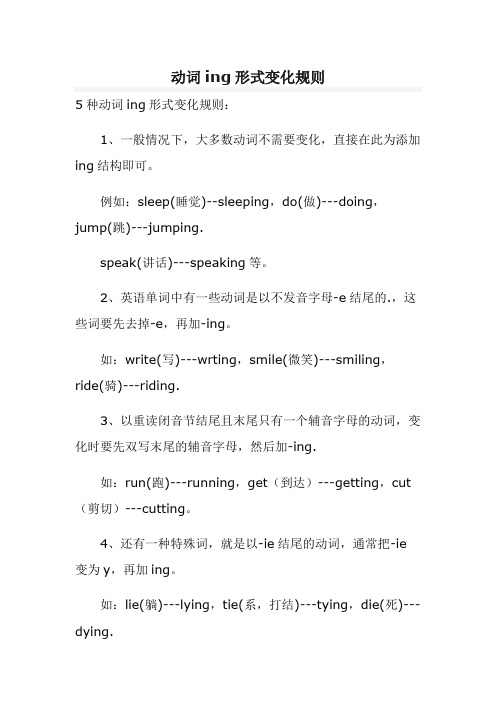
动词ing形式变化规则
5种动词ing形式变化规则:
1、一般情况下,大多数动词不需要变化,直接在此为添加ing结构即可。
例如:sleep(睡觉)--sleeping,do(做)---doing,jump(跳)---jumping.
speak(讲话)---speaking等。
2、英语单词中有一些动词是以不发音字母-e结尾的.,这些词要先去掉-e,再加-ing。
如:write(写)---wrting,smile(微笑)---smiling,ride(骑)---riding.
3、以重读闭音节结尾且末尾只有一个辅音字母的动词,变化时要先双写末尾的辅音字母,然后加-ing.
如:run(跑)---running,get(到达)---getting,cut (剪切)---cutting。
4、还有一种特殊词,就是以-ie结尾的动词,通常把-ie 变为y,再加ing。
如:lie(躺)---lying,tie(系,打结)---tying,die(死)---dying.
5、有人为这些动词的变化就变了一段口诀,以便好记:
动词-ing形式用途多,进行时态不可缺。
词尾若有哑音-e,去-e再加-ing。
一般重读闭音节,末尾辅音字母要双写。
还有一点要注意,变ie为y,再加-ing.。
动词ing形式的用法及变化规则

动词ing形式的用法及变化规则一.动词ing形式的用法1.正在进行时中,谓语动词后加ing. 如:I'm playing football.2.一些特殊表达..如: be good at doing sth enjoy doing sth.be busy doing feel like doing thank you for doingdo some cooking/cleaning/reading/shopping/washinggo swimming/fishing/shopping/skating/boating二.动词现在分词由动词原形在词尾加ing构成,其规则如下:1一般情况下直接加ingthink---thinking sleep---sleeping study---studying speak---speaking carry---carrying say---saying 2以不发音的字母e结尾的单词,去掉字母e,再加ingwake---waking make---making come---coming take---taking leave---leaving have---havi ng3以重读闭音节结尾,呈现“辅,元,辅”结构的动词,先双写末尾的辅音字母,再加ing 。
初中学过的这类词有:begin,cut, get, hit, run, set, sit, spit, stop,swim, beg, drop, fit, nod, dig, forget, regret, rid, 等。
(visit )不是以重读闭音节结尾,不用双写travel虽然重读第一音节,词尾音节不重读,但是现在分词仍要双写末尾辅音字母,然后再加ing ,如:travel---travelling.初中阶段此类词只有这一个4以 y 结尾的动词直接加ingcarry——carrying enjoy——enjoying5以ie结尾的动词,把ie改为y ,再加ing die---dying lie---lying要特别注意有些动词没有进行时态1、表示状态、思想、感情和感觉的动词,如:see, hear, love, know, want, hope, think等,没有进行时态。
动词加ing的各种形式

1.英语动词加-ing,通常是在原形词尾直接加-ing构成:cough—coughing,climb—climbing,stand—standing,fight—fighting2.以-e结尾的动词(1)如果动词原形以一辅音加一不发音的-e结尾,一般应去掉e再加ing:write—writing,hope—hoping,care—caring,stare—staring,plane—planing,have—having,save—saving, produce—producing, breathe—breathing(2)以-ie结尾的动词应先将e去掉,将i变成y然后再加-ing:die—dying,tie—tying,vie—vying,lie—lying(3)以-ee,-oe,-ye结尾的动词加-ing时应保留词尾e:see—seeing,flee—fleeing,free—freeing,agree—agreeing,hoe—hoeing,dye—dyeing,eye—eyeing(4)以-ue结尾的动词大多应先去e再加-ing:sue—suing,imbue—imbuing,construe—construing,pursue—pursuing,rue—ruing有时,词尾e可去掉也可保留:glue—gluing或 glueing,cue—cuing或 cueing, blue—blueing或 bluing,true—truing或trueing,clue—clueing或cluing3.以一元音加一辅音结尾的动词(1)如果动词最后一音节为重读闭音节,最后一个字母需要重复:run—running, stop—stopping, hop—hopping, plan—planning,star—starring,control—controlling但辅音x是个例外,无需重复(x其实起着两个辅音的作用):tax—taxing,relax—relaxing(2)如果动词最后一个音节为次重读音节,最后一个字母有时也重复:kidnap—kidnapping或kidnaping,program—programming或programing(3)如果动词最后一个音节为非重读音节,最后一个字母大多无需重复:open—opening,offer—offering,audit—auditing但在有些动词中,重复或不重复均可:worship—worshiping或worshipping,focus—focusing或focussing,cancel—canceling或cancelling,travel—traveling或travelling以非重读的-el结尾的动词加-ing时,英国英语习惯于重复词尾l,而美国英语则习惯于不重复1。
动词的-ing形式与动词的搭配问题

动词的-ing形式与动词的搭配问题一、只能接动词的-ing形式作宾语的动词:1、miss 失去I am sorry I missed seeing you while you especially visited me to my home.2、mind 介意Would you mind opening the window?3、enjoy 喜欢Young children enjoy helping around the house.4、give up 放弃He gave up gambling!5、admit 承认(不情愿的)Dana admitted feeling hurt by what I had said.Greene admitted causing death by reckless driving.6、finish 完成Have you finished correcting the students’ papers?7、avoid 避免You should avoid over-spending in the first half of the year.8、practise练习Practise putting the tip of your tongue between your teeth.9、escape 逃跑Don’t tell me you always escape being fined.10、excuse 原谅Please excuse my being tardy today!11、pardon 原谅Please pardon my disturbing you so rudely.12、delay 耽误Big companies often delay paying their bills.13、suggest 建议I suggest bringing the meeting to an end.14、insist on 坚持He insist on going with me.15、persist in 坚持She persisted in wearing that old-fashioned hat.16、can not help 禁不住情不自禁I can’t help thinking he’s still alive.17、deny 否认拒绝The witness denied having seen the accused man.18、put off 推迟He put off holding the meeting till next Monday.19、postpone 延期We’d better postpone discussing it till next week.20、favour赞成21、Understand 明白I can understand her wanting to live alone and be independent.22、Risk 冒险I can’t help wondering whether we should risk going without raincoats.23、Keep 保持News of successes keeps pouring in.24、Fancy 想象Sorry, but I don’t fancy going out tonight.25、Endure 容忍忍受The lazy bones didn’t fancy getting up at 4 o’clock every morning.26、Dislike 厌恶I dislike getting up early.27、Consider 考虑He was in low ebbs and considered going away.28、Anticipate期望预料We anticipate hearing from you again.29、Appreciate 感激I really appreciate your telling me that.30、Acknowledge 承认Mr. Smith acknowledged receiving the book.31、Imagine 想象I can’t imagine him knowing all that.32、Advocate 拥护主张He doesn’t advocate getting up too early.33、Facilitate 促进是便利Tape recorder facilitates studying English.34、Involve 包括House-keeping involves cooking, washing dishes, sweeping, and cleaning.35、Resent 厌恶He resented being asked to wait.36、Detest 厌恶She said she had always detested seeing a bull fight.37、Loathe 非常厌恶I’d rather go by sea, I loathe flying.38、Ensure 保证确保I can’t ensure his being there in time.39、Can’t resist 忍不住I can’t resist seeing chocolates.40、Resent 怨恨不快Does he resent my being here?41、Evade 逃避Evade paying taxes42、Mention 介意My wife didn’t mention my writing to my private secretary.43、Forbid 禁止The law forbids selling liquor to minors.44、Contemplate 打算注视I hope you would contemplate coming with us on the trip.45、Defer 暂缓延期They deferred making a decision.46、Recall 回忆记起I can’t recall having met him before.47、Approve 批准同意Exercise 1 Put the verbs in brackets into the correct forms, choosing between the –ing participle and the infinitive:1.He was in low spirits and even considered(go) away.2.The criminal even threatened (murder) the president.3.Practise (put) the tip of your tongue between your teeth and blowing: You will pronounceperfect th’s!4.You must endeavour __________ (explain) yourself more clearly, it is impossible _________(understand) what you are trying _________ (say).5.Bob contemplated _____________ (go) to Africa after graduation.6.I can’t help __________ (wonder) whether we should risk ________ (go) without raincoats.7.Don’t tell me you always escape __________ (be) fined because you have a very fast sportscar!8.Leave off ________ (bite) your nails.9.My mother detested ___________ (go) to classical concerts so I never learned ________(appreciate) classical music until I was old enough ___________ (start) a collection of records.10.He didn’t feel like _________ (work) so he suggested _________ (spend) the day in thegarden.11.You still have a lot _________ (learn) if you’ll forgive my ________ (say) so.12.Tim decided ___________ (put) broken glass on top of his wall ________ (prevent) boys________ (climb) over it.13.You certainly mustn’t miss ________ (see) this wonderful film.14.Do you recollect/recall ___________ (tell) John about the new house?15.The doctor advised ___________ (take) the car.16.I could not imagine that ________ (be) possible.二、即可接动词–ing形式,又可接动词不定式作宾语的动词:(一)接两种形式,意义无太大区别的动词如表示一般行为,用分词结构作宾语为多,如表示特定的活具体的动作,则用不定式作宾语为多。
后面接动词ing形式的动词
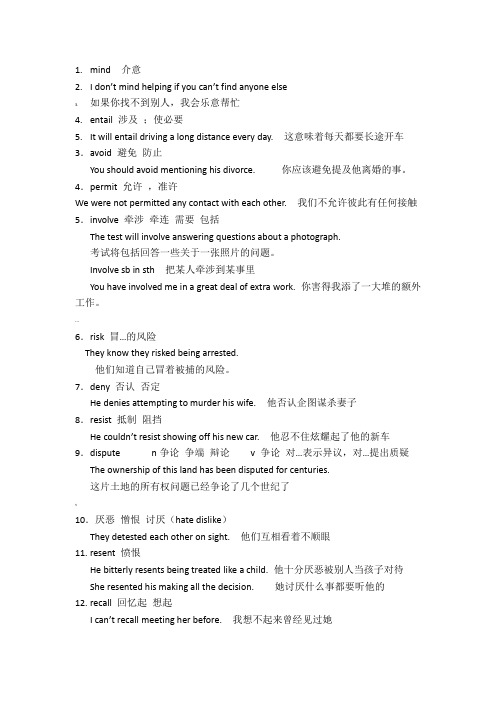
1.mind 介意2.I don’t mind helping if you can’t find anyone else3.如果你找不到别人,我会乐意帮忙4.entail 涉及;使必要5.It will entail driving a long distance every day. 这意味着每天都要长途开车3.avoid 避免防止You should avoid mentioning his divorce. 你应该避免提及他离婚的事。
4.permit 允许,准许We were not permitted any contact with each other. 我们不允许彼此有任何接触5.involve 牵涉牵连需要包括The test will involve answering questions about a photograph.考试将包括回答一些关于一张照片的问题。
Involve sb in sth 把某人牵涉到某事里You have involved me in a great deal of extra work. 你害得我添了一大堆的额外工作。
…6.risk 冒…的风险They know they risked being arrested.他们知道自己冒着被捕的风险。
7.deny 否认否定He denies attempting to murder his wife. 他否认企图谋杀妻子8.resist 抵制阻挡He couldn’t resist showing off his new car. 他忍不住炫耀起了他的新车9.dispute n争论争端辩论v 争论对…表示异议,对…提出质疑The ownership of this land has been disputed for centuries.这片土地的所有权问题已经争论了几个世纪了<10.厌恶憎恨讨厌(hate dislike)They detested each other on sight. 他们互相看着不顺眼11. resent 愤恨He bitterly resents being treated like a child. 他十分厌恶被别人当孩子对待She resented his making all the decision. 她讨厌什么事都要听他的12. recall 回忆起想起I can’t recall meeting her before. 我想不起来曾经见过她13. hinder 阻碍妨碍阻挡Hinder sb from doing sth 阻止某人做某事A former injury was hindering him from playing his best. 旧伤使他无法发挥出最高水平。
- 1、下载文档前请自行甄别文档内容的完整性,平台不提供额外的编辑、内容补充、找答案等附加服务。
- 2、"仅部分预览"的文档,不可在线预览部分如存在完整性等问题,可反馈申请退款(可完整预览的文档不适用该条件!)。
- 3、如文档侵犯您的权益,请联系客服反馈,我们会尽快为您处理(人工客服工作时间:9:00-18:30)。
1.mind 介意
I don’t mind helping if you can’t find anyone else
如果你找不到别人,我会乐意帮忙
2.entail 涉及;使必要
It will entail driving a long distance every day. 这意味着每天都要长途开车3.avoid 避免防止
You should avoid mentioning his divorce. 你应该避免提及他离婚的事。
4.permit 允许,准许
We were not permitted any contact with each other. 我们不允许彼此有任何接触
5.involve 牵涉牵连需要包括
The test will involve answering questions about a photograph.
考试将包括回答一些关于一张照片的问题。
Involve sb in sth 把某人牵涉到某事里
You have involved me in a great deal of extra work. 你害得我添了一大堆的额外工作。
6.risk 冒…的风险
They know they risked being arrested.
他们知道自己冒着被捕的风险。
7.deny 否认否定
He denies attempting to murder his wife. 他否认企图谋杀妻子
8.resist 抵制阻挡
He couldn’t resist showing off his new car. 他忍不住炫耀起了他的新车9.dispute n争论争端辩论v 争论对…表示异议,对…提出质疑The ownership of this land has been disputed for centuries.
这片土地的所有权问题已经争论了几个世纪了
10.厌恶憎恨讨厌(hate dislike)
They detested each other on sight. 他们互相看着不顺眼
11. resent 愤恨
He bitterly resents being treated like a child. 他十分厌恶被别人当孩子对待She resented his making all the decision. 她讨厌什么事都要听他的
12. recall 回忆起想起
I can’t recall meeting her before. 我想不起来曾经见过她
13. hinder 阻碍妨碍阻挡
Hinder sb from doing sth 阻止某人做某事
A former injury was hindering him from playing his best. 旧伤使他无法发挥出最高水平。
14. contemplate 考虑思量沉思苦思冥想
I have never contemplated living abroad. 我从没考虑过去国外住
15. necessitate 使….成为必要
His new job necessitate him/his getting up at six. 新工作使他不得不六点钟起床。
16. admit 承认招供
admit to sth /admit to doing
She admitted to having stolen the car. 她承认偷了那辆车
17. mention 提到写到说到
Nobody mentioned anything to me about it. 没有人跟我提过这事
18. escape 逃跑逃走
He narrowly escaped being killed. 他险些丧命
19. miss 未击中未得到错过
She narrowly missed hitting him. 她差一点打着他
20. defer 推迟拖延
The department deferred the decision for six months. 这个部门推迟了六个月才做决定
defer to sb/sth 遵从听从顺从
We will defer to whatever the committee decides. 我们会遵从委员会作出的任何决定
21. fancy 想要想做
Do you fancy going out this evening? 今晚你想不想出去?
22. forgive 原谅宽恕
Forgive me interrupting, but I really don’t agree with you.
请原谅我打岔,我真的不能同意你的观点。
